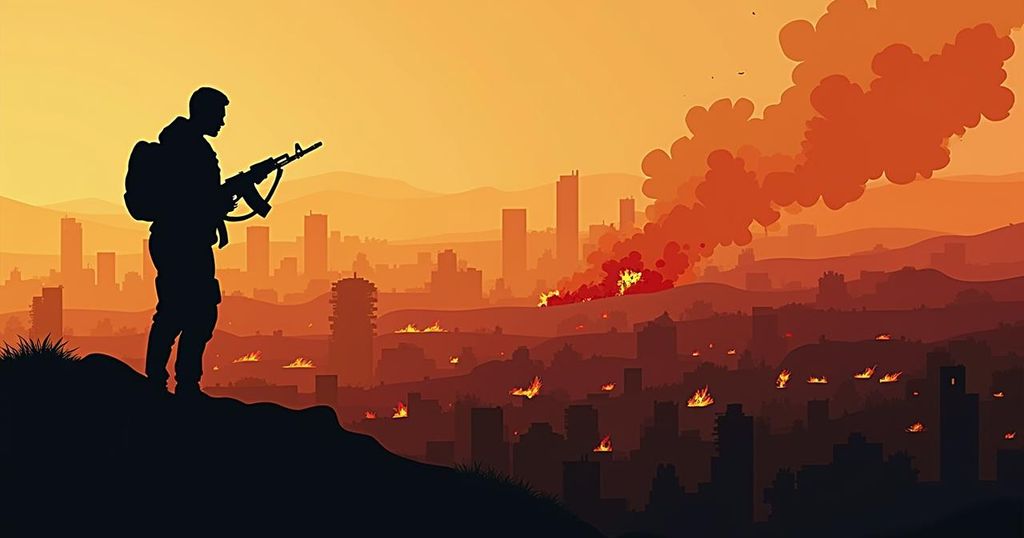Israel’s Third Lebanon War: A Critical Examination of Current Hostilities with Hezbollah
Israel’s Third Lebanon War has intensified, with ongoing conflicts between Israeli forces and Hezbollah on the border. Following significant military actions, including the assassination of Hezbollah leader Hassan Nasrallah, Israel appears prepared for further military operations despite the complexities of Lebanon’s terrain and historical precedents of inconclusive outcomes. Public support for military engagement is strong, and international reactions, particularly from the United States, will play a crucial role in shaping the conflict’s trajectory.
The ongoing conflict, referred to as Israel’s Third Lebanon War, marks an escalation in hostilities between Israeli forces and Hezbollah along the Israel-Lebanon border. Uncertainties persist regarding the scale, duration, and potential casualties resulting from this conflict, raising questions about whether it will transform into a broader war following extensive bloodshed over the past year. Israel demonstrates a clear resolve to deliver a significant blow against Hezbollah, an organization that has posed a consistent threat for decades. This determination follows a year characterized by Hezbollah’s frequent missile strikes on Israeli territory, prompting reciprocal actions from Israel. Recent actions have shifted the narrative; Israel has successfully targeted and killed leading Hezbollah figures, including their long-time leader Hassan Nasrallah, reducing the group’s missile capabilities while preparing its own populace for the impending conflict. Public sentiment appears to favor military action, with a substantial segment of the Israeli population supporting a strike against Hezbollah despite the historical precedents of inconclusive military engagements leading to substantial losses and impact on Israel’s international standing. The background of hostilities reveals a long-standing enmity between Israel and Hezbollah, which traces its origins to the 1982 Israeli invasion of Lebanon. Following that invasion, Hezbollah emerged as a formidable opponent, maintaining a military presence that ultimately forced a withdrawal of Israeli troops in 2000. Since that time, Hezbollah has grown into a powerful entity, primarily backed by Iran, accumulating an extensive arsenal capable of targeting nearly all of Israel. As tensions have escalated, Israel has engaged in defensive measures, including airstrikes against Hezbollah positions in response to missile attacks. The recent death of Nasrallah raises vital questions about Hezbollah’s future leadership and operational capacity, with a top Hezbollah official stating that the organization would replace its lost members and continue its attacks against Israel. Preparations for a ground invasion into southern Lebanon are reportedly underway. Israeli troops have conducted training exercises in anticipation of operations aimed at neutralizing the threat posed by Hezbollah to Israeli towns. However, Lebanon’s challenging terrain and Hezbollah’s entrenched positions present formidable obstacles for Israeli forces should a ground conflict extend beyond initial engagements. Internationally, the United States continues to affirm its support for Israel, with both President Biden and Vice President Harris endorsing military actions while simultaneously calling for a ceasefire in some contexts. The risks of a wider regional conflict remain, especially if Iranian retaliation follows the assassination of Nasrallah. In summary, the Israel-Hezbollah conflict now stands at a critical juncture, with Israel poised for a potential expansion of military actions within Lebanon, reflecting both tactical preparations and significant public backing. While Israel seeks to eliminate the immediate threats from Hezbollah, the historical legacy of conflict in the region calls into question the effectiveness and consequences of renewed hostilities.
Israel’s military engagement in Lebanon has roots dating back to the 1982 invasion aimed at countering the Palestine Liberation Organization (PLO). The emergence of Hezbollah as a militant organization dedicated to opposing Israeli interests solidified the group’s ongoing confrontations with Israel, which persisted through subsequent conflicts in 2006 and recent experiences leading to escalating tensions. Hezbollah’s alignment with Iran and its subsequent growth in military capability has led Israeli Defense forces to adopt a proactive stance in face of continuous assaults, laying the groundwork for another possible war within the region. The conflict’s complexities are exacerbated by the geographical and social dynamics within Lebanon, as well as the broader regional implications involving other state actors including Iran.
The current military engagements signify a critical period in Israeli-Hezbollah relations, with potential ramifications both locally and regionally. As Israel embarks on military operations with widespread public support, the historical outcomes of past invasions raise significant concerns regarding the effectiveness of this approach. The situation remains fluid, with external influences from the United States and potential responses from Iran complicating the landscape further. The strategic decisions made in the coming weeks will be pivotal not only for Israel’s security but for the surrounding geopolitical stability.
Original Source: www.jpost.com




Post Comment